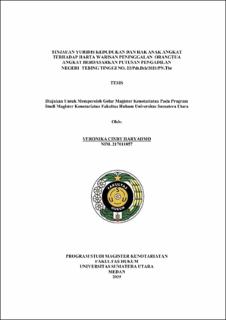Tinjauan Yuridis Kedudukan dan Hak Anak Angkat terhadap Harta Warisan Peninggalan Orangtua Angkat Berdasarkan Putusan Pengadilan Negeri Tebing Tinggi No. 23/Pdt.Bth/2021/Pn.Tbt
The Juridical Review of the Legal Status and Inheritance Rights of Adopted Children Based on the Decision of Tebing Tinggi District Court No. 23/Pdt.Bth/2021/PN.Tbt

Date
2025Author
Haryadmo, Veronika Cindy
Advisor(s)
Sembiring, Rosnidar
Maria
Metadata
Show full item recordAbstract
Adoption is an effort to incorporate a child, whether biologically related or not, into the family of the adoptive parents. Adoption must be conducted according to customary traditions or legal procedures. This research employs a normative legal approach with descriptive-analytical characteristics. The sources of data consist of primary, secondary, and tertiary data. The data is collected through library research and field studies, using interviews as the data collection tool. The collected data is then analyzed using a qualitative analysis method.
The research findings are as follows: First, adoption in Batak customs is similar to the provisions of Staatsblad 1917 No. 129, where adoption involves severing the adopted child’s ties with their biological parents and integrating the child into the adoptive family as a biological child. In contrast, Law No. 35 of 2014 allows adoption without severing the blood ties between the adopted child and their biological parents. Second, regarding the inheritance rights of adopted children, under Islamic law, there is no inheritance relationship between adopted children and their adoptive parents. However, Article 209 of the Compilation of Islamic Law (KHI) provides the right to allocate inheritance to adopted children through a will or mandatory will (wasiat wajibah). In Batak customs, adoption traditionally prioritizes male children to continue the family lineage and inheritance. Nowadays, female children can also be adopted, and several Supreme Court jurisprudences have allowed female adopted children to inherit from their adoptive parents. Under civil law, adoption according to Staatsblad 1917 No. 129 creates familial ties between the adopted child and the adoptive family, enabling the adopted child to become an heir to the adoptive parents. Third, the panel of judges in Decision No. 23/Pdt.Bth/2021/PN.Tbt ruled that the challenger was a legitimate heir of the adoptive parents (the deceased) and must be included as a party in the case. The judges recognized the challenger as a third party (derden verzet) whose rights were harmed, allowing them to file an objection lawsuit. Based on Decision No. 23/Pdt.Bth/2021/PN.Tbt, the court stated that the challenger, as an adopted child, was entitled to inherit from their adoptive parents, provided that the rights of biological heirs were not prejudiced. An adopted child can inherit from their adoptive parents if the adoption was formalized through a court decree.
Keywords: adopted child, customary law, Staatsblad 1917 No. 129
Collections
- Master Theses (Notary) [2307]
